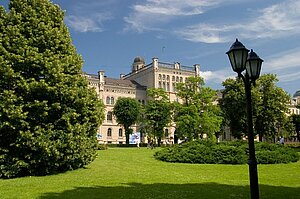Call for Participation - 7th International School in Cognitive Sciences and Semantics
-----
Sixth International Summer School in Cognitive Sciences and Semantics
Intensive course: Quantum computing, logic and cognition
University of Latvia, Riga
July 27-29, 2014
Faculty: Andris Ambainis (Computer Science, University of Latvia, Riga, Latvia)
Bob Coecke (Computer Science, University of Oxford, UK)
Michael Glanzberg (Philosophy and Cognitive Science, Northwestern University, USA)
Vyacheslavs Kashcheyevs (Physics, University of Latvia, Riga, Latvia) The course addresses a variety of theoretical and foundational issues in quantum computing. It will focus on the logical and physical scope of quantum computing. Topics to be addressed include the physical structure of quantum information, strategies and issues in experimental approaches to the physical representation and control of quantum information, mathematical models of quantum computing and quantum algorithms, diagrammatic patterns in quantum computing, and the relation of quantum computing computational models of cognition.
Audience: The course is primarily intended for graduate students in Cognitive Science, Computer Science, and Mathematics Application: Please upload CV and letter of application stating educational background and research interests.
Applications should be submitted by May 10
Applicants will be notified within 10 days after submission. The summer school will consist of 3 intensive days of lectures, seminars, and group discussions. After the course students will receive certificates. Tuition fee: 100 EUR covers meals and coffee breaks. Course Content Physical basis for quantum information
Prof. Vyacheslavs Kashcheyevs (University of Latvia, Riga, Latvia) Outline:
Prof. Andris Ambainis (University of Latvia, Riga, Latvia) Outline:
Prof. Bob Coecke (University of Oxford, UK) Outline:
Prof. Michael Glanzberg (Northwestern University, USA) Outline:
July 27-29, 2014
Faculty: Andris Ambainis (Computer Science, University of Latvia, Riga, Latvia)
Bob Coecke (Computer Science, University of Oxford, UK)
Michael Glanzberg (Philosophy and Cognitive Science, Northwestern University, USA)
Vyacheslavs Kashcheyevs (Physics, University of Latvia, Riga, Latvia) The course addresses a variety of theoretical and foundational issues in quantum computing. It will focus on the logical and physical scope of quantum computing. Topics to be addressed include the physical structure of quantum information, strategies and issues in experimental approaches to the physical representation and control of quantum information, mathematical models of quantum computing and quantum algorithms, diagrammatic patterns in quantum computing, and the relation of quantum computing computational models of cognition.
Audience: The course is primarily intended for graduate students in Cognitive Science, Computer Science, and Mathematics Application: Please upload CV and letter of application stating educational background and research interests.
Applications should be submitted by May 10
Applicants will be notified within 10 days after submission. The summer school will consist of 3 intensive days of lectures, seminars, and group discussions. After the course students will receive certificates. Tuition fee: 100 EUR covers meals and coffee breaks. Course Content Physical basis for quantum information
Prof. Vyacheslavs Kashcheyevs (University of Latvia, Riga, Latvia) Outline:
- physical representation of quantum information
- experimental strategies for control of quanta
- quantum non-locality from empirical perspective
Prof. Andris Ambainis (University of Latvia, Riga, Latvia) Outline:
- the basics of quantum physics from computer science perspective
- mathematical model of quantum computing
- quantum algorithms
- quantum computing and conventional computer science
Prof. Bob Coecke (University of Oxford, UK) Outline:
- Diagrams as process theories
- String diagrams as quantum models
- Quantum-classical processes, complementarity and phases
- Language meaning in a quantum-like model
Prof. Michael Glanzberg (Northwestern University, USA) Outline:
- relation of quantum computing to cognitive architecture
a. does it effect the classical model (e.g. Fodor).
b. does it effect the connectionism/classical model debate
c. does it have implications for interfaces across levels? - classical computability, recursion, and quantum computing.

 Academic Centre
Academic Centre